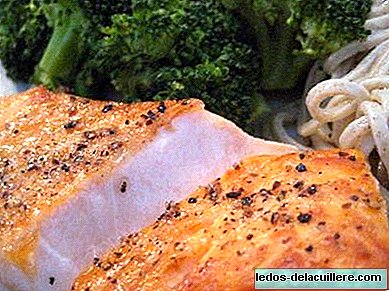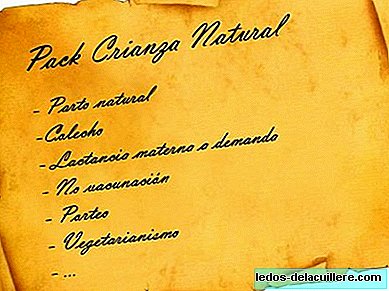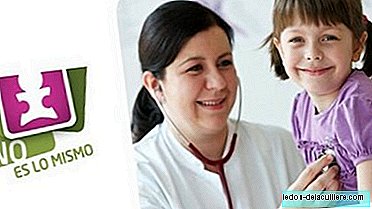
For years it has been discussed and studied about the effects of fish during pregnancy, how many pieces are healthy, what types of fish ... And the recommendations are not always the same as we have seen lately. A new study wanted to check the benefits of eating salmon during pregnancy.
In our review of fish that can be eaten during pregnancy we already included salmon, a species of blue fish rich in Omega-3 and that would not be harmful as other blue fish that accumulate mercury and that it has been recommended not to consume during pregnancy , breastfeeding and childhood.
But salmon is a smaller fish, and there are also varieties of fish farms that would minimize the risk of accumulating heavy metals in the body and that could be harmful to the mother or the fetus.
Scientists from the University of Granada have shown that the consumption of two pieces of farmed salmon a week during pregnancy is beneficial both for the health of women and for that of the child.
The study on salmon during pregnancy
The research, framed within a project funded by the VI Framework Program of the European Union called “The Salmon in Pregnancy Study” (SiPS), reveals that salmon consumption increases, both in women and their newborns, the level of omega 3 fatty acids, and improves the antioxidant defenses of both due to the levels of selenium and retinol contained in fish.
To carry out this work, the authors selected a random sample of pregnant women with low fish consumption. These women were divided into two groups: the Control group, which continued with their usual diet, and the Salmon group, which incorporated two portions of “made-to-measure” salmon into their diet, from the 20th week of pregnancy to giving birth.
This salmon is characterized by having been farmed in fish farms but with a controlled diet, using selected ingredients (oils and plant-based foods such as algae and zooplankton), so that it is rich in omega-3 fatty acids of vegetable origin. In addition, it contains antioxidant vitamins such as vitamins A and E, selenium and very low levels of contaminants.
The scientists verified through different samples that pregnant women who normally have a low intake of fish, when they consume two servings of salmon a week, increase the content of omega 3 fatty acids, both in them and in their newborns, and achieve Minimum recommended intake for these fatty acids.
In addition, the consumption of two servings of salmon a week during pregnancy does not increase the oxidative stress: Improving antioxidant defenses may be useful to prevent and / or reduce the additional oxidative stress associated with normal pregnancy.
Finally, the consumption of farmed salmon a week, by pregnant women in the study, does not adversely affect the antioxidant defense system, the metabolism of carbohydrates or lipids of their newborns.

Benefits of omega 3 during pregnancy
Omega-3 acids help control blood pressure, reduce the cholesterol rate and improve heart functions. It contributes to a better cognitive development of the baby since they are essential for the baby's brain development and would reduce their colds, while preventing the mother's depression.
All varieties of blue fish contain omega-3. Of the protein sources, fish represents the food par excellence. It also provides calcium, iron, vitamins A, B1, D and E, zinc ... In addition, the consumption of sea blue fish (like white) contributes iodine.
Remember that apart from eating a varied and balanced diet (we will not eat fish every day, nor the same fish always), to obtain the benefits of omega3 there are many other foods, but if we talk about fish and exclude those that accumulate excess mercury, Salmon is a good option.
In addition we would have white tuna, sardines, herring, mackerel, anchovy or bocarte, mullet, eel, horse mackerel or common rind, green, palometa, sea trout, dogfish ... In short, smaller fish that don't accumulate mercury. However, we must warn that smoked, salted or marinated varieties carry the risk of being contaminated by the anisakis parasite, so it is better to opt for cooked varieties.
In addition, if we want to vary and opt for foods other than fish, there are alternatives to take Omega-3 in other foods, such as flax seeds (which also help prevent constipation), hemp seeds, nuts (also rich in vitamin E and copper) and pumpkin seeds or pipes, fortified foods ...
In short, there are many options to take Omega-3 and benefit from its advantages, and it seems to be confirmed that consuming two pieces of salmon a week is good for the health of pregnant women and their babies According to this new study.












